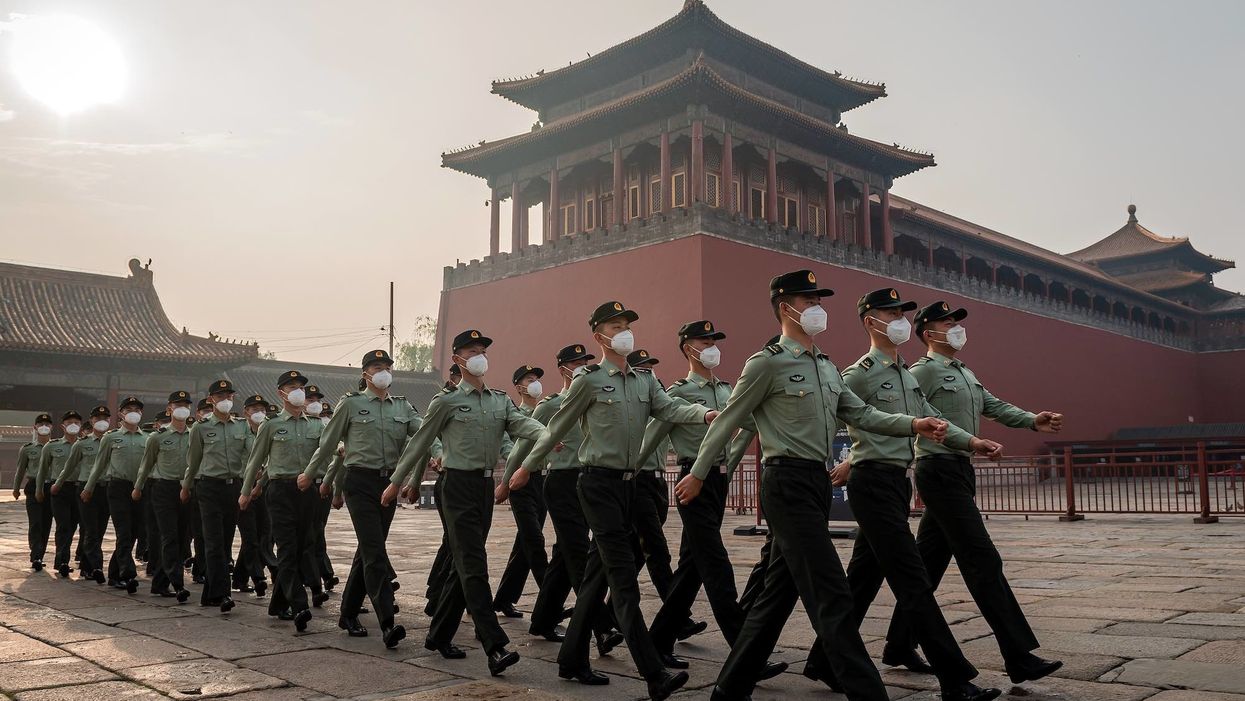
People's Liberation Army soldiers march next to the entrance to the Forbidden City during the opening ceremony of the Chinese People's Political Consultative Conference on Thursday. (Photo by NICOLAS ASFOURI/AFP via Getty Images)

Commies being commies
China announced that it is stepping up its abuse of Hong Kong citizens with a sweeping new national security law that will outlaw "foreign interference" and further quash pro-democracy forces in the once autonomous city.
A year ago, pro-democracy forces in Hong Kong began demonstrating against pro-China polices backed by the city's leadership, especially Chief Executive Carrie Lam. In June, thousands of protesters took to the streets to protest their local government's efforts to pass a bill that to make it easier for China to extradite fugitives from the city to the mainland.
The protests upset Communist Party leaders in Beijing, so the regime announced Thursday at its annual Chinese People's Political Consultative Conference that it would bypass the Hong Kong legislature and impose an oppressive new national security edict by fiat, the Washington Post reported.
Hong Kong has enjoyed relative autonomy since the British turned it over to Communist China in 1997. But recent and repeated moves by Beijing to suppress civil liberties have led to increasingly disruptive and sometimes violent protests by pro-democracy, pro-West factions.
The communist regime cited the protests as evidence that the sweeping new security law is necessary.
Chinese President Xi Jinping warned in December that his Communist Party would not tolerate challenges to its authority or interference from "external forces," the New York Times reported. But protests continued until the coronavirus pandemic led world leaders to begin issuing stay-at-home orders.
And a Thursday letter from China's foreign ministry said, "The opposition in Hong Kong have long colluded with external forces to carry out acts of secession, subversion, infiltration and destruction against the Chinese mainland," according to the Times.
The law, which Chinese leaders declared is a "direct response to last year's protests" that were spurred on by "secessionist forces" and outside influence, the Post said, "will ban secession, subversion of state power, foreign interference and terrorism."
Stanley Ng, a pro-Beijing member of China's legislature from Hong Kong and long-time proponent of the security law, said the city's failure to quell the protests only proved that China needed to step in.
"The social unrest last year showed that the Hong Kong government was unable to handle passing [national security legislation] on its own," Ng said, according to the Post. "Hong Kong's status will be sacrificed with or without this law if society is unstable due to the protesters' violence."
Pro-democracy forces were stunned by the move. From the Post:
[U]nder Xi's leadership, the Communist Party has encroached on Hong Kong's autonomy with stunning speed.
"I'm speechless," said Dennis Kwok, a pro-democracy lawmaker, of the proposed national security legislation. Kwok was singled out for criticism by Beijing and was recently removed from his chairmanship of a key legislative council committee. "This is a complete and total surprise and I think it means the end of one country, two systems."
Kwok said that the Hong Kong government and Beijing had used the coronavirus pandemic as cover to clamp down on the city.
"When the world is not watching they are killing Hong Kong, killing one country, two systems, and using social distancing rules to keep people from coming out to protest," he said. "This is the most devastating thing to happen to Hong Kong since the handover."
After the state announced its plan to implement the new security law, calls went out for protesters to take to the streets of Hong Kong.
"The arms of tyranny have reached Hong Kong," pro-democracy leader Ted Hui said, according to the Post. “Darker days are coming."
This move follows a recent trend of anti-democracy abuse.
Earlier this week, pro-China forces within the Hong Kong legislature had pro-democracy lawmakers forcibly removed and blocked from re-entry in order to install pro-communist leadership for a key legislative committee as the body fought over a bill that would criminalize disrespect of the Chinese national anthem.
And last month, pro-Beijing Chief Executive Lam used the coronavirus quarantine to arrest democracy advocates.